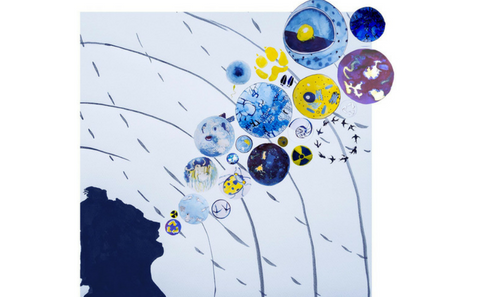
Minerva Scientifica is an enthralling, engaging multi-arts project from Electric Voice Theatre, which sets out to look at the links that exist between women scientists in history and the present day.
It seeks to find ways of increasing public engagement with the physical science and with the issues encountered by expert female scientists through a parallel exposure to women composers and artists.
We caught up with the team to find out more about the project, and their Echoes tour, which brings theatre, science and music together.
Minerva Scientifica is an evolving music-theatre project reflecting the lives and work of British Women Scientists told through the music of British Women Composers. Our patron is Judith Weir, Master of the Queen’s Music.
We are celebrating Scottish women and their achievements in both music and science. The importance of showing the connections between these two disciplines cannot be emphasised enough- Electric Voice Theatre
The project is currently touring the UK, working with science historians, Dr Patricia Fara and Catherine Booth, National Library of Scotland, Scottish Music Centre, Science Museum London and with scientists from Historic Environment Scotland, National Trust and Sussex University, and has run major projects at King’s College London, Newcastle and Edinburgh Napier Universities over the last five years.
Our Echoes tour will be taking the Edinburgh Festival Fringe five star solo music-theatre show Scottish Superwomen of Science starring Frances M Lynch, to locations across Scotland where each community will add its own local flavour, connecting with local scientists and composers past and present. Look out for it this autumn in Stirling, Loch Tayside, Coll and Wick.
The show includes encounters with Scottish Superwomen of Science, Mary Somerville, “Queen of the Sciences”; Williamina Fleming, the world famous “Astronomer fae Dundee” and beautiful music, old and new, classical and traditional, including work by composers, Helen Hopekirk, Marie Dare, Isobel Dunlop and Minerva Mathematica by Frances M Lynch, written for the Science Museum, London and recently broadcast on BBC Radio 3.
We are celebrating Scottish women and their achievements in both music and science. The importance of showing the connections between these two disciplines cannot be emphasised enough.
In an age when cultural activity is being marginalised in education at all levels, we risk losing creative development in future generations which will have an impact, not just on the arts but on scientific achievement – particularly in research. We want to show how the two disciplines connect in very real ways – not just creatively, but how the similar methods, processes and detailed analysis which take place in music, also occur in science – and how these processes often shed light on each other’s disciplines.
The performances on the Echoes tour will include new music created in collaboration with scientists from the local communities, and from research on historical scientists and composers from each of the nine tour locations. We will join forces with school children, community musicians and singers, and together devise new material as part of the performances.
Additionally, we will be running workshops in schools, and two public workshops: one at Strathpeffer and the other as part of a Fun Palaces weekend at Lyth Arts Centre.
Each performance and public workshop will be BSL interpreted, and the performances also have Integrated Audio Description and an accompanying Touch Tour.
The main challenge is not to get carried away with the absolute joys of discovering new things in science and music. The excitement of finding a new work by a long forgotten female composer, or learning from a scientist that salt can crack stone, or how electrons behave in a very musical way, or wanting to write a full length opera about every single historical scientist whose life cries out to be enshrined in a larger frame!
However, there is a lot to get done, many pieces of music to write, and a whole host of fascinating people from across Scotland to collaborate with and learn from. So mainly we’re too busy to notice how challenging it is – we’re just enjoying the work!
A new found love of music they haven’t heard before; of science they’d never thought of before; of stories they’ve not been told before; new thoughts about their own path in life; new connections with science and music in their local area, and a deep feeling that science and music belong together...
Oh and also they will physically take away a little scientific label with a woman scientist’s name on it and the link to our research website where they can find out more about her and the music relating to her story.
The Echoes tour continues next year too – alongside Minerva Scientifica projects at Southampton and Sussex University, appearances at festivals, performances for Science Museum London and English Heritage, and much more. We have continuing relationships with our researchers, and the Soroptimists, and other organisations who support our work. You will need to sign up for our newsletter to keep up (we find it a bit tricky ourselves).
Echoes is on tour throughout Scotland in September and October in 2018. See electricvoicetheatre.co.uk/echoes-minerva-scientifica for full dates and details.